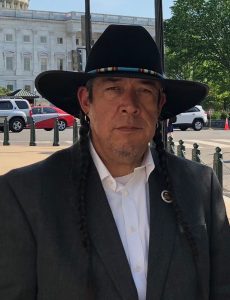Shaun Chapoose announces candidacy for President of NCAI
 Shaun Chapoose, a member of the Ute Indian Tribe and resident of the Uintah and Ouray Reservation in Utah, has officially announced his candidacy for president of the National Congress of American Indians. The election will be held during the 76th annual NCAI Convention & Marketplace in Albuquerque, New Mexico, on Oct. 20-25.
Shaun Chapoose, a member of the Ute Indian Tribe and resident of the Uintah and Ouray Reservation in Utah, has officially announced his candidacy for president of the National Congress of American Indians. The election will be held during the 76th annual NCAI Convention & Marketplace in Albuquerque, New Mexico, on Oct. 20-25.
Chapoose, a formal tribal chairman, currently serves as chairman of Utah Tribal Leaders, which comprises leadership from Utah’s eight federally recognized tribes. He also is the Uncompahgre Band representative for the Ute Indian Tribe Business Committee, and the co-chair of the Bears Ears Inter-Tribal Coalition.
Over the years, Chapoose has gained extensive experience working with all of the federal agencies, and all facets of tribal business, including oil and gas management, environmental issues, farm operations and cultural rights. He said he would like to see NCAI work with tribal leadership across the country to lead the charge in three main areas: sovereignty, self-determination, and tribal lands and resources.
“As Native peoples, we have inherent sovereignty, which has existed since time immemorial,” Chapoose said. “It was not bestowed upon us by the U.S. government, therefore it cannot be taken away. NCAI must join with tribal leaders to demand that the federal government uphold tribal sovereignty, respect the trust relationship, and honor the promises and commitments their ancestors made to ours over the past two centuries. We can, and we must, do more.”
Chapoose also is passionate about self-determination, noting that Native nations need to lead the discussion regarding what is in their communities’ best interests. He said it’s about more than having a seat at the table; rather, it’s about standing up for all tribes and insisting that the federal government honor existing treaty rights.
“We cannot go back in time,” he said, “but we also cannot forget who we are. We must work within the confines of today’s society—using the tools we have available—without losing sight of our ancestors, our traditions and our cultures.”
Chapoose’s concerns range from protecting health care and the Indian Child Welfare Act to preserving tribal lands and resources, including sacred sites and that most precious resource of all, water.
“We’re tied to the lands on which we’re born and raised,” he said. “They preserve our cultures, traditions and life ways for future generations. We must protect them, effectively manage them, and when and where necessary, develop them for the benefit of future generations.
“We also must take a leadership role in addressing climate change,” he added. “We were here first, and we’re still here. We have the knowledge and expertise to make America what it was supposed to be.”
Chapoose’s ties to NCAI run deep. Seventy-five years ago, Ute tribal leaders and other tribal leaders —including his grandfather— returned to Colorado, the Utes’ original homeland. Together, they formed NCAI in direct response to the threat of a U.S. policy seeking termination of their sovereignty.
“Because it originated in Utah, our tribe was on the front lines of the termination policy,” Chapoose said. “We can bring our extensive experience to the national level, so we can work together with all tribes to address these critical issues facing Native peoples today. It’s time for us to write the history.”
